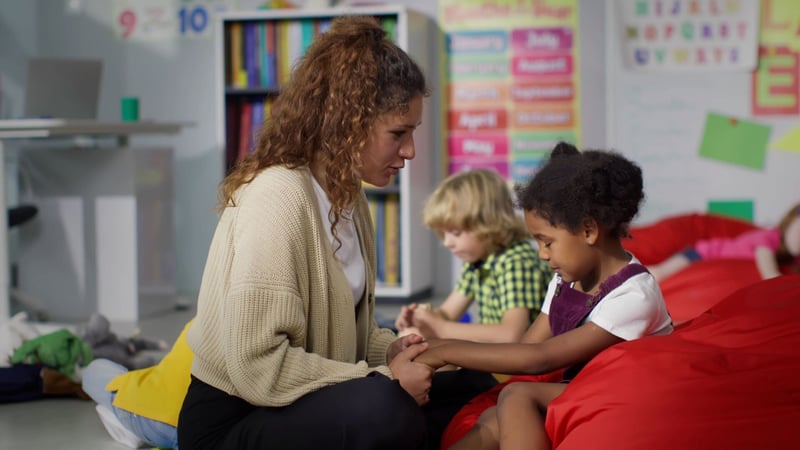Navigating Mental Health Challenges in Early Childhood Education
Written by: Tyler Oliver Save to Instapaper
Early childhood, a period of rapid growth and development, presents both exciting opportunities and unique challenges for parents and educators alike. During these formative years (ages 0 to 6), addressing mental health issues plays a crucial role in shaping a child's overall development and well-being. As October marks Mental Health Awareness Month, Kelly Eyre, Quality and Pedagogy Lead at Dibber International Preschools, shares valuable insights on the importance of nurturing mental health in young children.
Common Mental Health Challenges in Early Childhood
Young children often face various mental health challenges. Separation anxiety is common, particularly when they begin attending school or are separated from primary caregivers. This may result in excessive distress and a reluctance to attend school. Additionally, behavioural issues, such as tantrums, aggression, or withdrawal, can arise from difficulties in regulating emotions or adjusting to new routines.
Social skills development is another area where children may struggle. They might find it difficult to share, take turns, or understand social cues, which can hinder their ability to build relationships and engage in group activities. Furthermore, children exposed to trauma or high-stress environments may display signs of anxiety, depression, or withdrawal, impacting both their emotional health and learning capabilities.
Challenges Faced by Educators and Families
Educators are also under pressure, balancing classroom management and providing emotional support to children. This responsibility can lead to emotional burnout, particularly when dealing with diverse student needs. Without proper mental health training, managing emotional demands can become overwhelming.
Families face their own set of challenges. Parental stress from juggling work, parenting, and managing a child's needs can affect their ability to provide consistent support. Miscommunication between parents and educators may lead to misunderstandings, further complicating efforts to support the child's well-being. In some cases, limited access to mental health resources exacerbates these challenges.
The Importance of Nurturing Mental Health
Eyre envisions a world where every child grows up knowing their worth and potential. When children understand their intrinsic value and feel genuinely loved and appreciated, it builds a strong foundation for emotional well-being and resilience. This understanding empowers children to face life’s challenges with confidence and positivity, fostering emotional health and empathy.
“When children understand their worth and feel supported, they develop empathy and a sense of purpose beyond themselves,” says Eyre. “This self-awareness contributes to their mental health and helps them positively impact their communities.”
Addressing Mental Health Challenges: A Collaborative Approach
Identifying and addressing mental health challenges in early childhood requires collaboration between parents, educators, and mental health professionals. Early observation is key to detecting signs of distress, withdrawal, or behavioural changes. Open communication with children about their emotions helps parents and educators understand their mental state, while seeking professional support from child psychologists or counsellors provides targeted help.
For educators, ongoing mental health training is essential. Professional development equips teachers with tools to recognise and address mental health issues effectively. Collaborating with other educators, school counsellors, and mental health professionals creates a strong support system for both classroom management and individualised attention. Additionally, self-care is crucial for educators to maintain their emotional well-being and prevent burnout.
Supporting Families
For families, active involvement in their child’s educational journey is critical. Maintaining regular communication with educators ensures that concerns are addressed promptly. Seeking out community resources, support groups, and mental health services provides additional layers of support. Parents managing their own stress through counselling or other methods can improve the family dynamic and better support their child.
Conclusion
Addressing mental health challenges in early childhood education is a shared responsibility. By recognising common issues, fostering open communication, and seeking appropriate support, parents, educators, and families can create a nurturing environment that promotes mental well-being. Kelly Eyre reminds us, “Imagine the impact if every child grew up knowing their intrinsic value. It would enhance their mental well-being and contribute to a more compassionate and empathetic society.”
Press Release Submitted By:Dibber International PreschoolsContact Person: Kelly EyreWebsite: https://www.dibber.co.za/dibber-childhood
Total Words: 660
Get new press articles by email
Latest from
- South Africa’s Energy Future Takes Centre Stage - Electricity Expo Africa 2025 Launches
- Growing Green Minds - Eco Lessons for Young Children
- CFI Financial Launches Free Trading Seminar in Johannesburg
- AHF South Africa Marks Youth Day with Tribute to Young Leader’s Resilience
- Youth Month - The First Steps to Financial Stability Must Start Early
- The Heart Of The Home Celebrating The Power Of Motherhood In South African Culture
- The Hidden Risk To Your Business What You Need To Know About The Financial Intelligence Centre
- Benefits Of Learning Multiple Languages – A Parent’s Role In Language Development
- CFI Financial recognised at FMAS - 25 for innovation and impact in African trading
- Understanding Global Shifts and Strategic Responses for South African Traders
- CFI Launches CFI Academy to Empower Traders and Investors
- Menstrual Health Day (28 May) – Breaking the Silence, Ending the Stigma
- Making Every Moment Count - The Value of Quality Time with Children
- Making Every Moment Count - The Power of Meaningful Time with Children
- Financial Empowerment Isn’t Just for the Wealthy – CFI CEO Zihaad Israfil Shares Practical Steps for Every South African
The Pulse Latest Articles
- Education Is The Frontline Of Inequality, Business Must Show Up (December 11, 2025)
- When The Purple Profile Pictures Fade, The Real Work Begins (December 11, 2025)
- Dear Santa, Please Skip The Socks This Year (December 10, 2025)
- Brandtech+ Has 100 Global Creative Roles For South African Talent (December 9, 2025)
- The Woman Behind Bertie: Michelle’s Journey To Cape Town’s Beloved Mobile Café (December 9, 2025)
